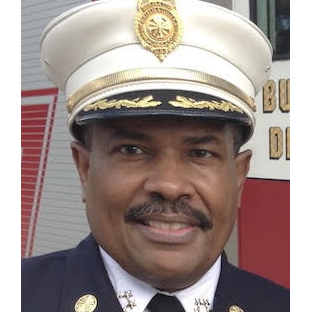Helping the Helpers: Addressing Needs of First Responders following MVIs
November 30, 2023
This Eighth Virtual National Town Hall on Mass Violence was hosted by the National Mass Violence Victimization Resource Center and the U.S. Department of Justice Office for Victims of Crime.
Key Takeaways

Rochelle Hanson, Ph.D.
A common thread - the importance of collaboration and connectedness. No one can do this alone, no should anyone expect this of themselves or others.

Angela Moreland, Ph.D.
First responders are considered victims and should utilize available resources to take care of themselves.

Garnell Whitfield Jr., Ret. Commissioner of Fire
Manage expectations, as an organization and as an individual, and those expectations can only be what we aspire to give our best.

Greg Mullen, Chief of Police at Clemson University
Create non-traditional partnerships (external mental health providers, chaplains, regional VSPs, and researchers) with entities that can bring experise back to your department or community.

Mary Fetchet, LCSW
Prepare in advance to ensure your personnel have the proper training for an effective response and resources to support their well-being in the aftermath of an MVI.
NMVVRC Resources
Tip Sheets (pdfs)
How to Identify an Experienced Trauma-Focused Therapist
Timeline of Activities to Promote Mental Health Recovery
Twelve Self-Help Tips for Coping in the Aftermath of Mass Violence Incidents
Vicarious Trauma and Compassion Fatigue Suggested Reading List
Federal Resources
Centers for Disease Control and Prevention
- Emergency Responders: Tips for Taking Care of Yourself
- Suicides Among First Responders: A Call to Action, NIOSH Science Blog, April 6, 2021
- Surviving Field Stress for First Responders training course, Agency for Toxic Substances and Disease Registry, May 19, 2023
COPS Office, U.S. Department of Justice, Officer Safety and Wellness Program
Office for Victims of Crime, U.S. Department of Justice: Helping Victims of Mass Violence & Terrorism Toolkit: Planning, Response, Recovery & Resources
Office for Victims of Crime - Terrorism & Mass Violence Resources
Office for Victims of Crime - Vicarious Trauma Toolkit
Substance Abuse and Mental Health Services Administration (SAMHSA): First Responders and Disaster Responders Resource Portal – Disaster Technical Assistance Center
U.S. Fire Administration, Federal Emergency Management Agency - Behavioral Health Resources for First Responders
Veterans Administration, National Center for PTSD - Psychological First Aid Online Training Course
National Organizations and Resources
Center for Firefighter Behavioral Health
Center for the Study of Traumatic Stress
First Responder Center for Excellence
First Responders Support Team, First Responders Foundation
International Association of Chiefs of Police
National Child Traumatic Stress Network
- Pause-Reset-Nourish (PRN) to Promote Well-Being: Use as Needed to Care for Your Wellness (pdf)
- Psychological First Aid - Skills for Psychological Recovery (online Course)
National Fallen Firefighters Foundation
National Sheriffs’ Association
The Role of Police Executives in Assisting Victims of Mass Violence: Lessons from the Field, Police Executive Research Forum, September 2020 (pdf)
Coping with Stress Following a Mass Shooting, Center for the Study of Traumatic Stress (pdf)
Grief Leadership: Leadership in the Wake of Tragedy, Center for the Study of Traumatic Stress (pdf)
